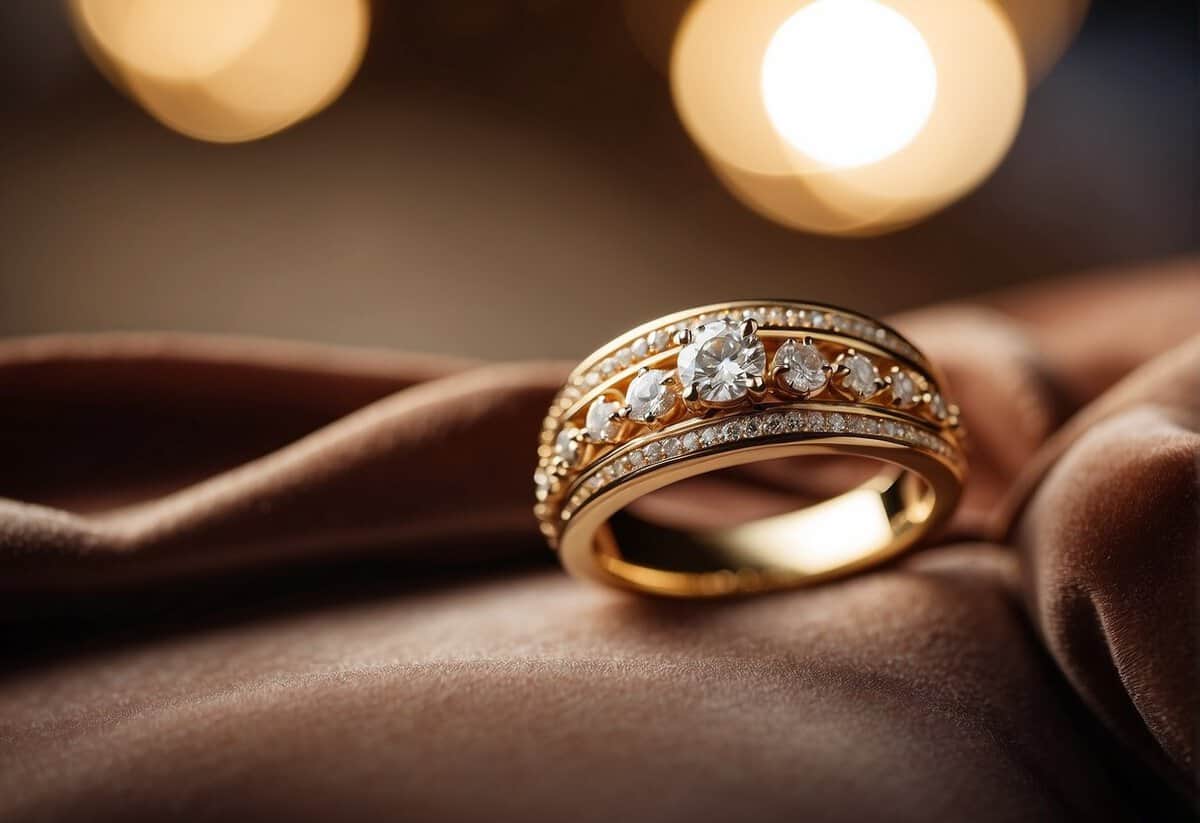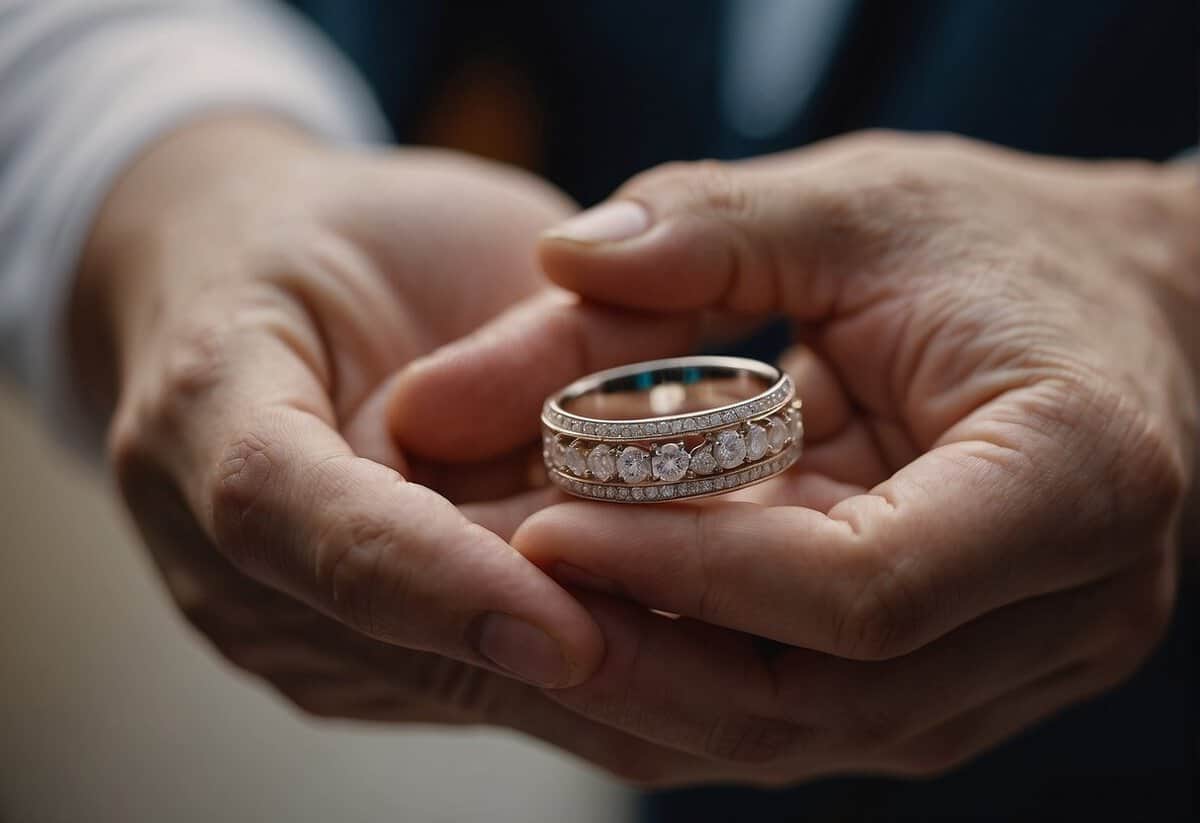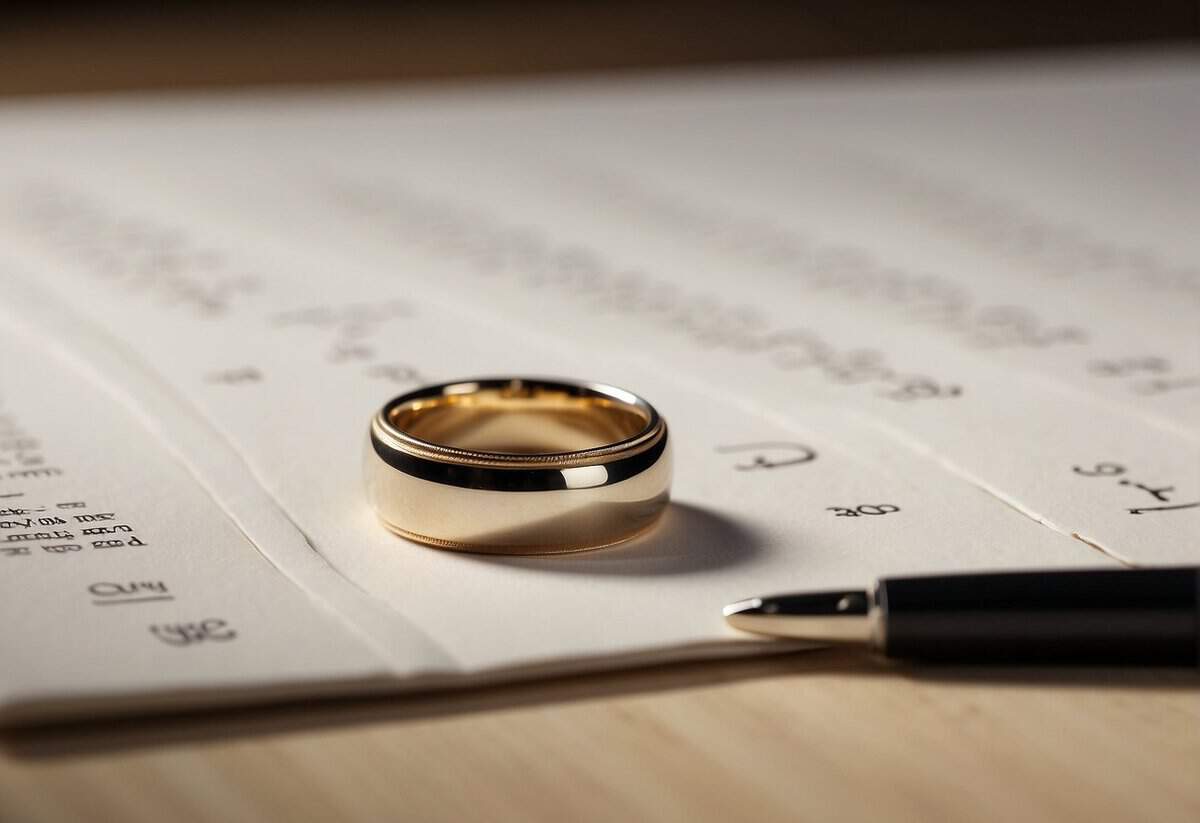Can I Wear My Wedding Band Before the Wedding? Unpacking Tradition and Personal Choice
When it comes to wedding traditions, there is a charming blend of cultural significance and personal preference that informs how couples approach their big day. Among these traditions is the timing of sporting the wedding band. The wedding band is a powerful symbol of love and commitment, often reserved for the special ceremony where two individuals vow to share their lives together. There are varied opinions and beliefs on whether it is appropriate to wear a wedding band before the moment it is traditionally bestowed during the wedding ceremony.

In some circles, wearing the wedding band before the actual wedding day is steeped in superstition and considered to be bad luck. This stems from the band’s role as a symbol of unity between partners, and any premature wearing could, according to myth, bring negative energies or jinx the relationship. However, many modern couples have started to question these beliefs, viewing the wedding band through the lens of personal meaning rather than strictly adhering to tradition. For them, wearing the wedding band beforehand could be a testament to their unwavering commitment or simply a practical decision to ensure a proper fit before the wedding.
Key Takeaways
- The wedding band symbolizes love and commitment typically exchanged during the special ceremony.
- Beliefs about the timing of wearing wedding bands vary, with some viewing it as bad luck and others seeing it as a personal choice.
- Modern practices are increasingly personalized, with couples considering practicality and their preferences over traditional etiquette.
Cultural and Symbolic Significance of Wedding Bands

Wedding bands are rich with symbolism and vary greatly across cultures. They are not just accessories but encapsulate a blend of tradition, marriage vows, and deep-seated beliefs.
Role in Wedding Ceremonies
The exchange of wedding bands during ceremonies represents a physical manifestation of your commitment and love for one another. In many cultures, the moment you place the ring on your partner’s finger, you are binding your lives together with a symbol that has no end, signifying eternity.
Variations Across Cultures
- Western Societies: Traditionally, you wear your wedding band on the fourth finger of your left hand, echoing the belief that this finger contains the vena amoris — the vein of love leading directly to the heart.
- Eastern Cultures: It’s not uncommon to find wedding rings worn on the right hand, reflecting diverse cultural practices and symbolisms.
For further insights into cultural differences, the symbolism of wedding bands varies greatly and is often intertwined with a culture’s history and societal norms.
Historical Beliefs and Superstitions
Historically, wedding bands come with a host of superstitions and beliefs.
- Wearing Before the Wedding: Some believe that trying on your wedding ring before the big day can bring bad luck or even curse the marriage.
- Material and Design: The material of the ring, usually a precious metal, and often the inclusion of gems, hold their own significance, with gold representing purity and diamonds symbolising indestructibility.
For an in-depth exploration of these beliefs, consider reading about the meanings and symbolism that wedding rings carry.
Pre-Wedding Considerations for Couples

When approaching your wedding, you’ll encounter various traditions and expectations. Understanding these can help guide your choices, particularly when it comes to the symbols of your forthcoming union, such as rings, and the messages they convey.
Engagement vs. Wedding Jewelry
Engagement Ring: Typically a sign of intention, the engagement ring you choose is a precursor to the wedding band. This ring often features a notable gemstone and symbolizes the promise of marriage.
Wedding Band: On the other hand, wearing your wedding band symbolizes the actual commitment post-wedding. It’s usually more straightforward, often a band of precious metal, representing the everlasting nature of your union.
Communicating Commitment
Your engagement ring publicly announces your intention to marry, acting as a physical testament to your partner’s promise. The transition from being engaged to married is marked by the exchange of wedding bands, an act that solidifies your love and commitment to one another. Choosing when to wear your commitment, whether before or strictly on your wedding day, is personal and varies based on individual preference or cultural beliefs.
Choosing the Right Ring
Selecting a ring isn’t just about style; it’s also about practical considerations.
- Ring Size: Ensure the fit is comfortable; a trial period before the wedding can prevent any discomfort on the day.
- Preference: Your ring should reflect your personal style and the nature of your relationship—whether it’s traditional, modern, or completely unique to you as a couple.
- Individual Wishes: Discuss with your partner your thoughts on wearing the rings before the ceremony to be in accord with each other’s views and vows.
Deciding on jewelry as a tangible representation of your relationship should be a joyous part of your engagement journey, communicating to the world your dedication to one another.
Personal Preferences and Modern Practices

When it comes to wearing your wedding band before the nuptials, you’re truly in the driver’s seat. Your personal beliefs and comfort take precedence in today’s flexible approach to pre-wedding jewelry.
Reflecting Individuality and Values
Your choice to don or delay wearing your wedding band before you say “I do” is a personal one, deeply rooted in what values and beliefs are most important to you. In some circles, tradition dictates that the band should remain off the finger until the official ceremony as a symbol of the impending bond. However, if your personal belief system or style leans towards viewing the wedding band as just another piece of jewelry, you might opt to wear it as an early token of your commitment.
Modern Trends in Wedding Bands
In modern times, the expression and display of your love and partnership through a wedding band can take many forms.
Comfort and convenience: Many people now prioritize these as much as the symbol itself.
Personal choice and modern trends: These have led to a rise in wearing stackable rings that can include the wedding band, often worn before the actual wedding.
Technological advances in jewelry design: They allow for a vast spectrum of styles that reflect the uniqueness of your relationship.
Remember, whether embracing or eschewing convention, your decision should foremost be about what feels genuine to you in celebrating your union.
Etiquette and Guidelines for Wearing Wedding Bands

Understanding the etiquette and guidelines for wearing wedding bands helps you honor both tradition and personal preference. It’s important to navigate the customs with respect to family wishes and avoid any superstitious pitfalls associated with pre-wedding ring wearing.
General Etiquette for Wearing Bands
When it comes to wedding jewelry, there are established guidelines that dictate how and when to wear your wedding band. Traditionally, you don’t wear your wedding band before the actual ceremony. Post-exchange, it’s typically worn on the ring finger of your left hand, although some cultures place the ring on the right hand. It’s also customary to wear your wedding band closest to your heart, meaning it should be below your engagement ring if you wear both.
Avoiding Potential Bad Luck
Superstition plays a part in wedding traditions, influencing some to think twice about donning the band before the day. Whether you are superstitious or not, it’s considered bad luck by some to wear your wedding band before exchanging vows. This is thought to bring negative energy or premature finality to your commitment. To sidestep potential bad luck, wait to wear your band until after the official ceremony.
Respecting Family Traditions and Customs
Your family traditions and customs are often integral to wedding protocols. You might find that certain rules about wedding bands are relaxed in your family circle. It’s valuable to have conversations with family members to understand their expectations. For instance, in some traditions, mothers or grandmothers may pass down a family heirloom ring to be worn before the wedding. Recognizing these practices and incorporating them where possible shows respect to your family and friends who are part of your celebration.
Frequently Asked Questions

Navigating wedding traditions can be tricky, but understanding the dos and don’ts of wedding bands before your big day is essential. Here, you’ll find clear answers to some common questions you might have.
Is it considered bad luck to wear your wedding band before the ceremony?
Traditionally, some believe that wearing your wedding band before the ceremony is bad luck, as it may jinx the marriage. However, this is a superstition and varies with personal and cultural beliefs.
Should the bride see the wedding band before the day of the wedding?
There is no set rule that prohibits a bride from seeing her wedding band before the wedding. This decision is up to you and your partner’s preferences and the cultural significance you both place on the wedding bands.
What is the proper way to wear a wedding ring set?
Typically, the wedding ring set should be worn with the wedding band first on the finger, closest to your heart, followed by the engagement ring.
Are there any superstitions associated with wearing a ring on your wedding finger when you’re not married?
Yes, there are superstitions that suggest wearing a ring on your wedding finger when not married could signal to potential partners that you are not available, affecting your love life. However, such beliefs are subjective and largely vary across different cultures.
When is the appropriate time for one to start wearing their wedding band?
The appropriate time to start wearing your wedding band is typically during the wedding ceremony, when it is exchanged by the couple as a sign of their commitment to one another.
Is it acceptable to wear a wedding ring if you’re not legally married?
Wearing a wedding ring without being legally married is a personal choice. Some individuals wear commitment rings to symbolize their relationship status, even though it is not a legal marriage.

